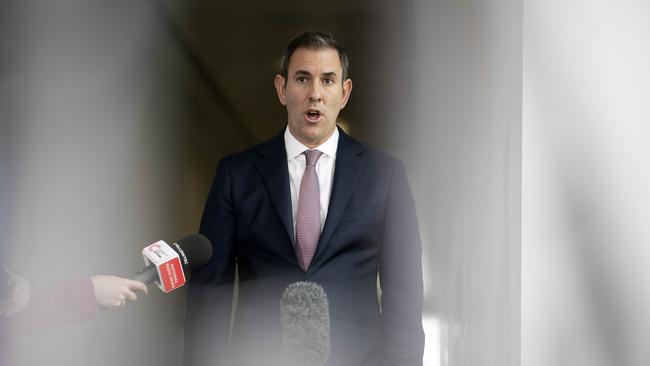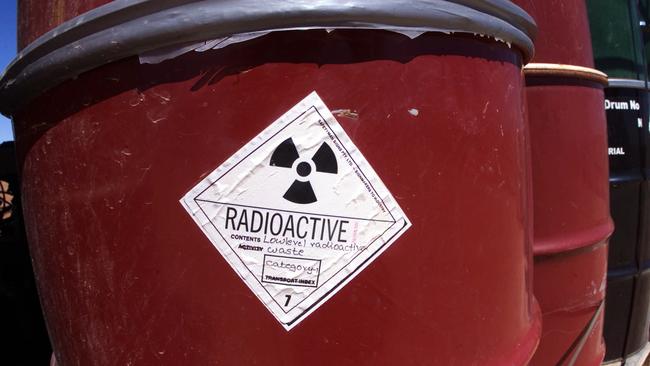Labor’s franking credit collision course with regulator
With talk of a global recession washing over Australia, Treasurer Jim Chalmers would be better off keeping investors in his corner for the coming financial storm.

Business
Don't miss out on the headlines from Business. Followed categories will be added to My News.
There’s just three days to go before the door closes on feedback over Labor’s proposal to close off one area of the franking credit regime, but already Treasury has been rushed with responses arguing planned rule changes could have unintended consequences.
The retrospective nature of the sweeping proposal, which centres on the notion of using capital raisings to fund franked dividends, has put it on a collision course with the nation’s powerful bank regulator.
In mid-2020, as the Covid crisis deepened, Australian Prudential Regulation Authority chairman Wayne Byres wrote to the nation’s bank bosses, urging them to take a conservative position on paying out dividends. He said in the face of heightened uncertainty banks should consider sources other than core capital to help pay dividends. That year Westpac undertook a $2.8bn raising while NAB made a monster $3.5bn raising. Both banks paid fully franked dividends after the raising.

“For 2020, APRA expects (banks) will retain at least half of their earnings, and actively use dividend reinvestment plans and/or other capital management initiatives to at least partially offset the diminution in capital from distributions,” APRA’s Byres told the nation’s banks in July of that year.
The technical nature of franking changes would normally be glossed over, but they go to the heart of Labor’s disastrous 2019 electoral loss, when a proposal to scrap the franking credits regime spooked many investors. Influential fund manager Geoff Wilson led the charge on the previous battle over franking credits and he has signalled he is prepared to fight loudly against the latest changes. He has requested more time for Treasury to take feedback on the proposal, saying he has hundreds of shareholders from his listed Wilson Asset Management family of funds wanting to put in a submission.
“This legislation is definitely bigger than everyone thinks and it will have a dramatic, detrimental effect on the capital markets,” Wilson said.
Another fund manager, Angus Gluskie, who is chairman of the Listed Investment Companies & Trusts Association, told Treasury the proposed legislation as drafted would appear to “inadvertently catch many thousands of situations of legitimate company operation and could accordingly delay or significantly discourage the normal processes of capital raising, investment and economic growth within Australia”.
Reignite fears
Tinkering with franking credit policy only serves to reignite fears among self-funded retirees that Labor is looking to shut off the franking credit regime by stealth.
Treasurer Jim Chalmers has denied this, saying the previous policy is long buried. He also points out the proposals were first released by the then treasurer Scott Morrison in the 2016-17 Mid-Year Economic and Fiscal Outlook. Chalmers also argues the changes are technical in nature and were a matter of cleaning up the mess of the previous government that never got around to introducing the rules it included as part of a budget document.
However, six years in the markets is a very long time and Chalmers does have a say on the retrospective nature of the rule changes – or whether to bring them back at all.
At the time the measures were forecast to raise $10m annually for Canberra. But with the tens of billions of dollars raised by corporate Australia as funding markets were shaken by the Covid crisis, the impact would be much bigger.
Some of these Covid funds found their way back to investors in the form of fully franked dividends, which means some investors, including bank shareholders, could be looking at retrospective tax payments.

The proposed rules apply to all distributions paid after December 2016, according to the draft legislation. They say this was made clear when they were announced.
The draft legislation aims to prevent companies from “unlocking” franking credits by using capital raisings to fund share dividends. The draft legislation says the changes are an integrity measure to prevent companies from manipulating the system to obtain inappropriate access to franking credits. It sees capital raisings as an “artificial arrangement” to fund the payment of franked distributions to shareholders, but it doesn’t distinguish between acceptable activities and the loophole it is trying to close.
The catch-all nature of the planned changes could force boards to think twice about fund raisings. The draft rules say even if all of the funds raised by a company are quarantined and used for a specific purpose, “this may serve to free other funds to be distributed that would otherwise have been required to be used for that purpose”.
Here the cash from the raising would still be considered as funding the dividend, which would have broader implications. The rules in the draft form also apply to underwritten dividend reinvestment plans or an underwritten rights issue.
With talk of a global recession washing over Australia, cost of living, inflation and higher rates, Chalmers would be better off keeping investors in his corner for the coming financial storm rather than fighting a battle he didn’t start.
A new ERA
Uranium miner ERA was kidding itself, trying to crash through a $300m capital raising that left the door open for a development of the controversial Jabiluka mine in the Northern Territory, which its controlling shareholder didn’t want to proceed.
ERA picked the wrong battle with its 86.3 per cent owner Rio Tinto, with the global mining giant determined to show it has been trying to learn the hard lessons of its Juukan Gorge cave disaster of two years ago, which cost it a chief executive and raised serious questions about its social licence to operate.
Even before the Juukan disaster, Rio Tinto had made it clear it had not wanted Jabiluka to move ahead without the permission of the Mirarr People, the traditional owners of the region. Indeed Rio’s Australian chief executive Kellie Parker has travelled to meet with representatives in recent months to take on their concerns.

Rio always had more to lose than ERA through any signals to the market that Jabiluka could be developed down the track.
The mine development is on a long-term care and maintenance arrangement and the Jabiluka lease is scheduled to expire in two years.
ERA chairman Peter Mansell has now realised he was never going to win the battle and had little choice but to go, especially after Rio Tinto called for his resignation in recent days. Two other independent ERA directors, Paul Dowd and Shane Charles, also flagged their resignation.
ERA had been seeking to raise $300m to help pay for the higher-than-expected costs for the rehabilitation of the now-closed Ranger uranium mine nearby. The Mirarr people are also the traditional custodians of the Ranger lands.
Earlier this year ERA had warned of a blowout in costs from $973m to between $1.6bn and $2.2bn, which had at the time raised the ire of Rio.
Further anger came through an independent expert’s report, commissioned by Mansell and two independent directors for the rehabilitation funding, which put a valuation on the lease covering the Jabiluka resource.

The independent report noted that while ERA doesn’t have traditional owner’s approval the mine would be a “strategic project with a potential long-term” life of mine. The lease also assumed Jabiluka was sitting on 137,000 tonnes of uranium ore-equivalent and highlighted that political support was again falling behind uranium as a clean energy source.
Rio responded to this, saying it remained “deeply concerned that the opposition to further uranium mining on the land of the Mirarr People, the Traditional Owners of the area, has not been appropriately recognised in any funding proposals put forward by the IBC (independent board committee)”.
Rio had said there was a “strong difference of opinion” between it and ERA over whether successful rehabilitation could underpin potential future growth opportunities, despite the Mirarr people’s long-held opposition to further uranium mining on their country.
On Monday ERA said: “It is inaccurate to suggest or imply that ERA has been seeking to raise funds, through the interim entitlement offer, for the development of Jabiluka or any other mine”.
Through the exit of Mansell, Rio now has cemented control of its errant subsidiary. This also means Rio will now be on the hook when it comes to help funding the Ranger rehabilitation.
johnstone@theaustralian.com.au
Originally published as Labor’s franking credit collision course with regulator



